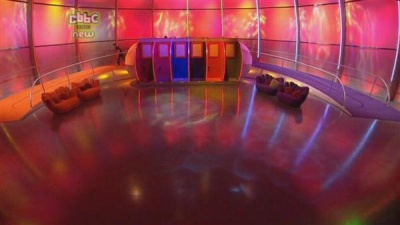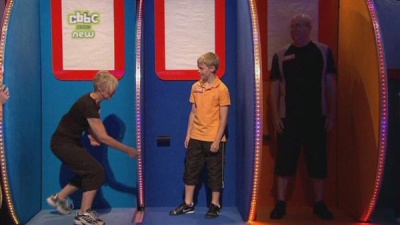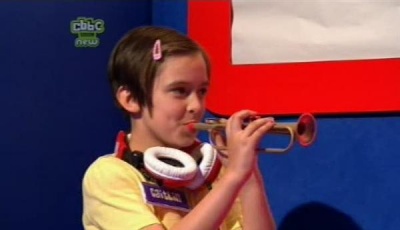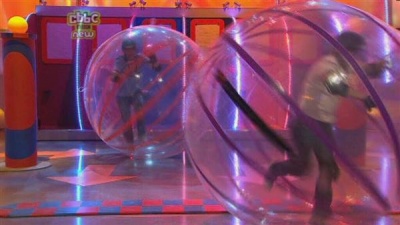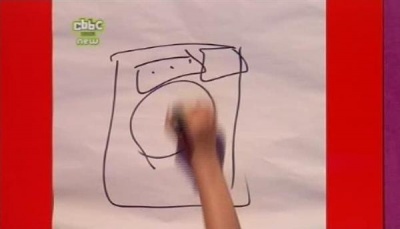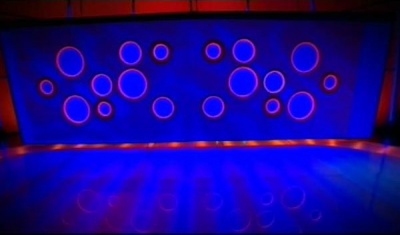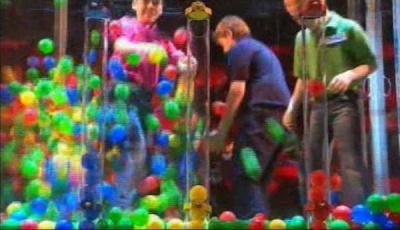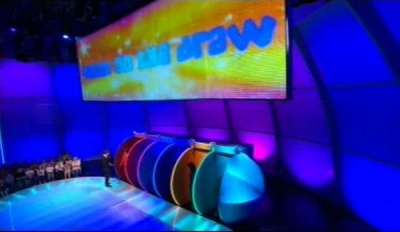Weaver's Week 2011-07-10
Last week | Weaver's Week Index | Next week
Later, University Challenge goes social; now, we review the same show twice.
Contents |
Copycats
Series 1, first broadcast November 2009-January 2010
A jaunty piece of music, and some cartoon graphics that look like fun. The show is under way, and in the opening titles it sets out its stall: entertainment, perhaps with a little something else. Hosts for the entertainment are Sam and Mark, CBBC's answer to Richard and/or Judy. They introduce two teams of six players – three children and three adults, each billed as "Someone's Family". It's slightly inaccurate, as some of the competitors are friends or neighbours, but we'll let that pass in the interests of entertainment.
After the brief introductions – learning names, relationships, and an embarrassing fact about one of the players – we're into the main part of the show. Three times during the programme, each of the families will stand in their own little cubicle, all in a line. The audience and viewer can look into each of the places, but between each of the players is a retractable door. These will open and close during the rounds.
Round one is "Mime Time", in which the first person picks a card containing an action they have to do. These are well-chosen actions, they allow much emphasis and exaggeration to get the point across. For instance, playing a trombone, or conducting an orchestra. The first player sees the card, and the door opens for ten seconds, allowing them to mime this action to the second person. Then the first door closes, the next door opens, and the second player can mime to the third. And so it goes down the line, until the fifth player performs a mime to the last. There's no-one after the last player, so they must attempt to give the action named on the card. If they can do it, they earn the family 50 points. If not, it goes back down the line for ten fewer points each time; the first person to see the mime would only get 10 points for their answer.
This round will repeat through the programme, first as mime, then as "Quick on the Draw", an art round, in which the teams draw something with a black marker pen, such as a washing machine. Then it comes back again as "Music Round", a round in which players use a mouth-trumpet to hum the chorus line of a well-known popular song. Copycats has to have cross-generational appeal, so it has to use songs known to children and grown-ups, such as "Dancing queen" or "The hokey-cokey". If we're lucky, we'll hear how "I will survive" turns into "Over the rainbow" via Chinese whispers on a mouth-trumpet.
In between these rounds, there are challenges for the competing families: one plays after "Mime Time", the other after "Quick on the Draw". These challenges are difficult, but not impossible – an example is sitting on red balloons to burst them all, and doing that within 90 seconds. All of the games have a strict time limit, and if the family succeeds in their challenge, they'll earn 50 points. If they fail by so much as one balloon, the opposition will earn 25 points for, as the hosts and audience put it, doing "absolutely nowt".
Audience response is important on Copycats: every time that Sam or Mark ask the producers to close the doors, the audience echoes their cry. The hosts also have an important role, giving their reactions in very quick cutaway shots during the round: peering around the doors, covering their eyes or pulling expressive faces.
Time is important during the relay rounds, and the first two are marked by music stings that repeat every ten seconds. Both stings are sufficiently jaunty to fit in with the theme of the show, and – from the one episode we've re-viewed – only just avoid becoming an irritant when we're hearing them for the tenth time in three minutes.
The programme is building to a climax, in which three members of the family will charge around the studio inside giant plastic hamster balls. As one does. The required route contains some sharp turns around thin pillars, on top of which are perched balls. Should the teams dislodge these balls, they'll lose 25 points from their score. There's also a long run around the back of the audience's raked seating, and the two teams' paths should cross there and at front of stage.
The first team home wins 100 points, which we think is a little much: most games will be within 50 points or so by this stage, and effectively boil down to the faster hamster runners, irrespective of earlier copying. But this is a minor quibble, something that we can live with because it ensures the show remains competitive right to the end. In true The Crystal Maze style, the winning family wins a prize they'll take together; in the sample episode, a session in a recording studio. Throughout the game, this is referred to as "a mystery prize", presumably because each family has selected the prize they'd like to win.
It's got a lot, has this show: it's entertaining, it flows well, the game gets progressively harder as we go on, and the audience is clearly getting into it. What can possibly go wrong?
Copycats 2.0
Series 2 aired from January 2011
A number of changes were introduced for series 2. Out went Gavin Griffiths' jaunty theme music, and in came Paul Farrar's usual sort of electronica. Not that we'll hear much of it, because the opening titles have a commentary from well-known television voiceover Alan Dedicoat. The opening animation has also been replaced, by patterns repeating themselves across the screen. It feels different, more sterile. Hosts for the show are Sam and Mark, CBBC's answer to JK and Joel.
Let's meet the teams, for this season they are Someone's Team, and not their Family. We'll see a clip of the team at their audition, all of them making fools of themselves in the approved manner. And, er, then straight into round two. Not so much as a name-check for the other players. We don't approve of elongated chatter with players, but it's a little bit rude not to at least tell us who these other people are. Give us a name, or some form of relationship. Are the adults the captain's parents, teachers, Scout leader?
The game begins with round two, Quick on the Draw. Draw something, pass it down the chain from Anonymous Team-member to Anonymous Team-member, and snigger as a picture of a kitten turns into a cow. Before that can begin, the hosts have to give the command, "Close the doors!" The audience, as is right and proper in the brave new world of Copycats 2.0, respond with absolute silence: the motion is accompanied only by one of Paul Farrar's electronic wheezes.
We then lose one of the teams (temporarily, just so as not to confuse any adults who might be half-watching), while the other plays The Copycats Challenge. This task is played by the captain and two of their Anonymous Team-members, and they are asked to do something a bit tricky, like throw a ball through a small target some distance away from them. There are points every time this task is completed, but these points won't be added on until the end of the game.
It's a different way of playing the challenge, it removes the possibility that one of the teams will score points for doing absolutely nowt. The hosts provide a perfectly good commentary as the game progresses. Unfortunately, we viewers don't really get to hear that commentary, as it's playing in the background while Alan Dedicoat provides a further commentary over the top.
This additional voiceover really kills the atmosphere in the game: we can see that something exciting is happening on screen, we can just about hear that something exciting is happening, but the main thing we have to hear is commentary from someone who is quite clearly watching this on screen. It's the difference between having commentary from the world cup stadium in Germany, and from a BBC basement in London.
After this comes round three, now slightly but definitely renamed as "The Music Round". We can tell this from the video wall, which has risen above head height. Is that all the video wall does? Bit of an expensive thing to have when a piece of cardboard would do as well. The video wall rises to reveal the cubicles in which the captain and their Anonymous Team-members stand, and to which the presenters shout, "Close the doors!", and to which the audience shouts nothing. Then the other team plays the exact same Copycats Challenge round, right down to the detail of which hole they should try to throw their balls through. Then it's round one, "Mime Time", and then a winner is declared.
Hang on, wasn't there meant to be a thrilling finale involving oversized hamster wheels? There is a thrilling finale – the winning captain and two Anonymous Team-mates are invited into the Ball Room. It is, quite literally, a room full of balls. Most of them are coloured green, but some are red, blue, and yellow. Each player must catch twelve of their coloured balls as they fly up from the ground, propelled by jets of air. Having caught a ball, the player is then to deposit it in a special collecting point; players who complete their dozen can help their team-mates, because all three columns must be filled within a minute to win the prize.
This is a thrilling finale, played in a transparent rectangular cuboid and involving posting the right coloured things into collecting points. Any resemblance between this and any other game show finale is entirely coincidental, and apparently if we say otherwise we'll get a visit from Auntie Sabrina. So there.
The prize is not so thrilling: it's a Copycats trophy. It's the show's logo, mounted on a spring, and then mounted on a plinth. Clearly, very little expense has been spent on this prize. Teams who win their show but don't complete the challenge will be given Copycats t-shirts, and we think they'll actually come out ahead on the deal.
What went wrong? Losing the jaunty music was a mistake. Not introducing the teams at all just feels wrong – even after watching a show all the way through, we have no idea who half of the people on screen are, still less why they're on screen. The Copycats Challenge round looks good on paper, but doesn't work well on screen, and Alan Dedicoat's commentary sucks so much life out of proceedings it's a wonder we didn't slump into a coma, or watch OK TV. The final round is actually good, but the prior finale was better.
In short, Copycats 2.0 is the Windows ME of television shows. It's similar enough to the old show as to be familiar, but different in lots of ways, and very few of these changes are for the better.
University Challenge
Heat 1: Warwick v Edinburgh
"So happy that University Challenge is back – my excuse not to go out on a Monday has returned", wrote Penfolder on a microblogging site just before tonight's show. It's the first of 37 nights in for Penfolder between now and next Easter. Some of them will have the added attraction of Only Connect, but not tonight's episode. "Would only be better if on BBC HD so you could really see their spots." Ooh, TheMrsWillimas is cheeky, and it's the other part of the Monday Quiz Phenomenon that will air in HD.
We pose the question, is it good fortune to begin the series by sneezing? Edinburgh think so, but they proceed to get the next three bonuses wrong. Former British prime minister Dr. Gordon Brown is one of their alumni, and BeckaYork is annoyed that she's not listed as one of Warwick's famous alumni. She is now. It's only the third bonus set of the series, but Warwick are showing their class by picking two of three on Greek theatre.
Had the university's former rector successfully abolished it, Edinburgh wouldn't have picked up points on "boom and bust", nor the Hidden Transmission Indicator of the day, on US state capitals. "Any long nights misspent on the computer game 'Call of duty' will be helpful", says host Jeremy "Thumper" Paxman before the first visual round, on the alphanumeric designations of weapons. He seems to be a fan, and lots of people on the net say they've got three more than the team. Edinburgh has the lead, 40-35.
"University Challenge trending worldwide, amazing" reports SamuelButcher. We have no idea what that means, but it's probably good. Warwick take the lead back with the next starter, only for Edinburgh to pull back with Orwell's essay on Dickens. "A collection of village idiots"? Got to be "The Pickwick Papers". Warwick get the next starter, and prove to be perfect on the Doppler effect.
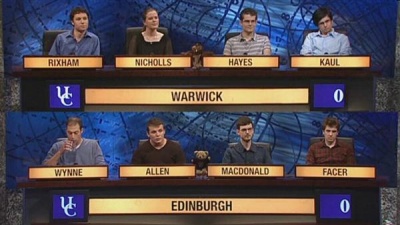 Warwick: Martin Rixham, Celia Nicholls, Tom Hayes, Sumac Kaul
Warwick: Martin Rixham, Celia Nicholls, Tom Hayes, Sumac Kaul
Edinburgh: Ben Wynne, Mark Allen, Tim MacDonald, Tom Facer
"Watching university challenge. Not one of the Edinburgh team are Scottish. Typical." AdelleSLevin, fair point. "If the enemy without were the Argentinians, who were the enemy within?" is the gist of one starter. "The cabinet", replies the wag from Edinburgh. Ha ha ha plonk, the sound of us laughing our head off. "Arthur Scargill", the answer someone else got. More Hidden Transmission Indicators with songs popular during the US Civil War, which is good for their resident Canadian, allowing Warwick to take a 125-80 lead.
"The satisfaction of get questions right on university challenge is quite amazing", according to Selspiero. Edinburgh wish they could agree with a set on potassium, and Warwick are unsatisfied after a set on poetic descriptions of birds. Homophones for towns is better territory for Edinburgh, and the second visual round is the quintessential UC round, Name That Opera House. Their lead is 155-115.
Traditionally, the first show of a new series features a performance good enough to make the repechage, the play-off for the four highest-scoring losers in the opening round. By which token, we need Edinburgh to begin a comeback right ... now! Well, Warwick have a missignal, but two starters are dropped, and they get the next starter, and do well on geophysics.
"Not getting many correct in new series of university challenge tonight. Out of practice", says Octogog. Keep watching, dear viewer, this'll be going most of the way till Easter. Warwick wrap up the win with another starter, and they storm away with questions about the nicknames given to parliaments. At the gong, Warwick has a clear win, 220-125.
Warwick had three players with at least four starters, which has to bode well. Rather than tracking bonus conversion rate, we're computing Total Conversion Rate this year, simply the number of questions a team answered correctly from those asked to them. Warwick were right in 33/56 questions, Edinburgh in 17/44, and the overall accuracy was 50/83. Over on the interwebs, S0phie0 says, "4 is a good score, right? *hopeful face*" Enough to become the Week's Randomly Selected Score of the Week, so yes.
Next match: Trinity Cambridge v Birmingham
This Week And Next
The Irish parliament has decided to block all calls to premium rate telephone numbers. Readers will recall how over 3600 calls were placed to a charity competition, in support of one TD's son. The cost was borne by taxpayers for four years until the son, himself now a member of parliament, paid the bill. Following the escape at a rapid speed of a lovely horse in 1998, the committee has also decided that a working bolt should be fitted to the door of the parliamentary stable.
Ratings for the week to 26 June show The Apprentice leading the way with 8.8m viewers, and In It to Win It returns on 4.85m. "It's a flop" claimed Het Grauniad of Penn & Teller: Fool Us, before observing that it had 3.55m viewers – over 4m after counting ITV-HD and ITV+1. Odd One In also had 3.55m, The Apprentice You're Fired 3.4m, and Come Dine With Me 2.1m. We're pleased to see Four Rooms leap into Channel 4's top 20, 1.6m there.
Over on the digital channels, Britain's Got Talent Us was the top game show, 700,000 viewers on ITV2. Good weather cut into Come Dine With More4's audience, 530,000 on Sunday afternoon. Third place for CBBC's Splatalot, 385,000 viewers saw children falling into the water, and Dick and Dom being Dick and Dom.
There's a Who Wants to be a Millionaire special (ITV, 9pm Friday) to mark two weeks since the end of the school year. While off school, we could follow the Quiz Trippers (C4, 5pm weekdays), visit the Silent Library (5*, 10pm Tuesday), and endure Chris Moyles' Quiz Night (C4, 10.30 Friday). A couple of Welsh oddities: Jest a Minute comes to Radio 4Xtra (9.30am Thursday), and Cariad@Iaith (S4C, 9pm nightly) may yet pass as a game show. ITV pushes its Saturday schedule back an hour next week, so Odd One Out begins at 8.15, Penn & Teller: Fool Us at 9.
Unlike some other publications, we'll be back next Sunday, when we're down to review The Marriage Ref in its new 10pm slot. We watch these shows so you don't have to.
To have Weaver's Week emailed to you on publication day, receive our exclusive TV roundup of the game shows in the week ahead, and chat to other ukgameshows.com readers, sign up to our Yahoo! Group.


